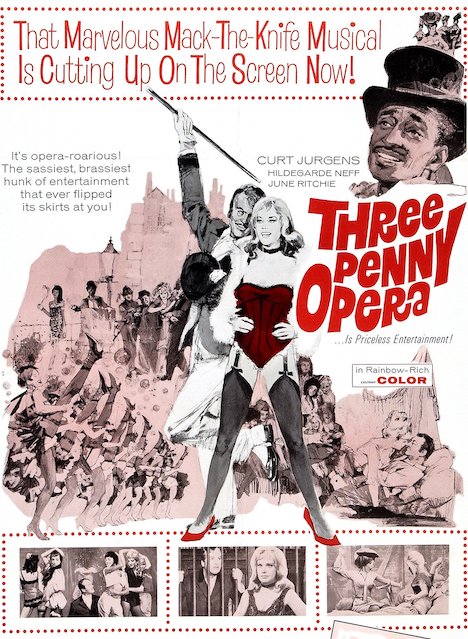Friday, October 16, 1964
THE THREEPENNY OPERA (Die Dreigroschenoper). Written by Bertolt Brecht. Adapted for the screen by Wolfgang Staudte and Günther Weisenborn. Based on The Beggar’s Opera (1728) by John Gay. Music by Kurt Weill. Directed by Wolfgang Staudte. Running time: 124 minutes.
CAPTAIN MACHEATH (CURT JÜRGENS), formerly of Her Majesty's Light Cavalry and affectionately known to his friends as "Mack the Knife,” is an elegant hero.
He is well-groomed, gallant to the ladies and not a bit out of character as he glowers down at his embarrassed intended executioner (for whom the trap of the gallows has failed to spring) with a disgusted, "Bungler!"
He is ever admirable.
His movie is not.
The Threepenny Opera, which closed this week [1964] at the International Cinema, is a sad attempt by the Levine organization to edit a restricted-appeal commodity into mass market material. Indeed, the attempt was handled in a manner so obvious as to be almost unbelievable.
Bertolt Brecht was the gamey sort of playwright who saw his stage as a didactic cockpit. It was only natural, then, that his 1928 rewriting of The Beggars Opera (from 1728) should take the form of an attack upon the rapaciousness rampant in his own postwar Germany. He has been called a writer of animated harangues.
There are definite indications that, left in its original form and equipped with subtitles, the movie might well have enjoyed moderate acclaim. The sets are engagingly designed to incorporate the gaudy fascination of tawdry elegance.
The costume colours sparkle with a pastel surrealism. The dubbing, however, jars the audience into searching for lost syllables.
To the credit of the original European director, Wolfgang Staudte, the film is presented in the manner of the stage. He turns his camera to the task of heightening the illusion of stagecraft rather than the reality of life.
Staudte moves his characters within a confined world built from theatre properties and painted backdrops. The players — among them Gerte Fröbe as Macheath’s beggar king nemesis JJ. Peachum and Hildegarde Neff [sic] as his unforgiving former lover Jenny Diver — remain ever aware that they are representatives rather than individuals.
The version released here adds Sammy Davis Jr. to the mix. The American acts as our genial host, dancing into a pre-credits scene to entertain us with the bawdy original version of the Mack the Knife theme.
Offhandedly, he perches to the side of a movie screen and proceeds to indicate the high points of the action to appear thereon.
Cleverly, he freezes the action at various points to interject commentary. It is almost as if the melodramatic style of the story and Viennese-flavoured music were a private joke among friends.
Almost, but not quite. Davis’s service is really a disservice, stopping the flow and breaking the continuity. The characters of the drama pale next to his slick sophistication.
The effort ends up defeating itself.
The above is a restored version of a Varsity review by Michael Walsh originally published in 1964. For additional information on this archived material, please visit my FAQ.
Afterword: Published some 56 years ago, the above review was the work of a college freshman who thought writing for the campus newspaper might be fun. It was. What started out as playtime grew into something like an apprenticeship as I learned the craft — journalism — that became my life’s work. At the time, I had other plans, ones that were reflected in my pursuit of a degree in the social sciences. (If you really must know, my BA is in sociology).
In hindsight, I believe my take on The Threepenny Opera might have been significantly different had I been an English major. Because I was taking courses in political science, history and economics, I focused on what I considered to be the bungled attempt of an American distributor to maximize returns on its German acquisition. Inflicting Sammy Davis on us as a way of making it “accessible” just underscored the uneasy relationship between art and commerce in the commercial film industry. Or so I thought. That issue fascinated me then, and, as a deep dive into this Reeling Back archive shows, it has remained a staple of my critical style.
Hildegard Knef (or, as she was billed in her U.S. films, Hildegarde Neff) was nearing the midpoint of her 54-year film career when the The Threepenny Opera arrived in Toronto. Born in 1925, she made her movie debut in the final years of Germany’s Third Reich. (It is said that the blonde ingenue caught the eye of Nazi propaganda minister Joseph Goebbels, but that she had the good sense to avoid any meeting.) Surviving the Battle of Berlin and a brief confinement in a Soviet prison camp, Knef returned to the screen in 1946. Although her wartime relationships limited her American opportunities, she went on to enjoy international stardom and, around the time of The Threepenny Opera, she broke out as a singer-songwriter. Knef died in 2002 at the age of 76.
